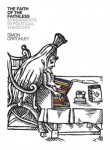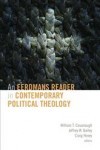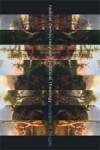
Religious truth is like troth, the experience of fidelity where one is affianced and then betrothed. What is true, then, is an experience of faith, and this is as true for agnostics and atheists as it is for theists. Those who cannot believe still require religious truth and a framework of ritual in which they can believe. At the core of Wilde’s remark is the seemingly contradictory idea of the faith of the faithless and the belief of unbelievers, a faith which does not give up on the idea of truth, but transfigures its meaning.

We began work on this Reader with the realization that there was no recent collection of readings in contemporary political theology. Our moment is complex and difficult to come to grips with. It is characterized by God refusing to go away, with people of numerous faiths not taking the much-touted, purely secular politics lying down. Whether one sees this as a recent development (post-9/11, say) or the way things have always been depends largely on one’s perspective. Do the most pressing questions have to do with Christian theology’s inherent and ineradicable relevance to all things political (human well-being, the nature of power, and so on)? Or do they have to do with the reverse—the fundamentally theological nature of politics, even where religious questions have been thought most successfully to have been purged from it? It will take more than a reader to answer such questions, but collecting a wide variety of voices in one place can help us understand why we are now faced with them.
“I think China has to face the fact that Mao was a monster, one of the worst people in human history … You’ve got to break the spell.” So spoke Robert Bellah in a recent interview while promoting yet another book, Religion in Human Evolution. We’ll return to Chairman Mao in a moment, but first a few comments about Bellah’s old-fashioned position.
I should add, from a Christian point of view, liberty is neither a virtue nor an ideal. History is ripe with examples of how liberty may turn to tragedy for individuals as well as for whole peoples and civilizations. Nonetheless, there is, it seems, a stubborn fact: in the soul of one who is not free there can neither be reason, nor beauty, nor love. One could say that a man doesn’t really exist as a man without these, and can’t even begin to comprehend the divine. Shortly before his death Christ told his disciples: “Unless I go the cross, the Holy Spirit will not come to you.” And do you know why? Because as long as there is some higher authority, be it even God personified, from whom men simply take words as facts, as some kind of a command, then they are not acting according to their own free will. And community with the Holy Spirit is reserved for free souls. Without freedom, love is impossible.
Commenting on the role of the state in a recent article in the Church Times (UK), John Milbank as one the leaders of Radical Orthodoxy says that the state has no goals “save its economic power and no interest in the person save as an atomised cog in a well-oiled machine”. In other words, it is hard to see how the state contributes anything other than an instrumental approach to the affairs and concerns of its citizens. Such a negative and dismissive interpretation of the state seems the predominant view not only within influential sources in theology but also from the realms of more radical political philosophy. Why is this so and is it a satisfactory and adequate understanding? If it is not, what alternative approach might be adopted by a Political Theology?

The business of religion, to use that unfortunate turn of phrase, is to change the world. The theo-political implication of radical democracy is that we cannot wait for a God to save us. If democracy indeed is the political instantiation of the death of God, then this is a task that is ours alone.
Today, speaking in tongues and prophecy are more apt to be equated with personal piety than political resistance. This too represents an incomplete understanding of Christ’s ministry and mission.
As the Iowa Caucus approaches, increased attention is being paid to the religious affiliations of the candidates for the Republican presidential nomination. Much of this discussion has centered upon Mitt Romney’s Mormonism, but the media has also paid a significant amount of attention to Newt Gingrich’s Catholicism. The latest round of controversy in the mainstream media began with Laurie Goodstein’s New York Times piece, in which she speculated about whether Gingrich’s 2009 conversion to Catholicism fits into a broader shift towards the right for Catholic participation in American politics in the post-Kennedy era. Likewise, Barbara Bradley Hagerty’s NPR piece narrated the details of his conversion process, highlighting the pivotal role of his current wife, Callista, as well as his attraction to the intellectual tradition of the Church.
Given the important role played by American Catholics in determining the outcome of presidential elections, many commentators have speculated that Newt Gingrich might be the one to capture the prized Catholic vote.
For Gingrich’s campaign, his recent conversion from Southern Baptist to Roman Catholicism almost functions like the makeovers of popular reality TV shows. His past record of “double spousal abandonment” and congressional ethics violations, we are told, are sins of a previous life that are irrelevant for the newly made-over “Catholic Newt.”
In late November, Newt Gingrich, the former Republican Speaker of the House of Representatives, surged in the polls to become the frontrunner in the race for the Republican nomination in the 2012 presidential election. In recent days Gingrich’s poll numbers have faltered, but he retains a slight lead over former Massachusetts governor Mitt Romney in national polls.
Having converted to Catholicism in 2009, Gingrich is one of two Catholics running for the nomination. He has not made his Catholicism an important part of his campaign rhetoric, although he has not hidden it, either. At many of his campaign stops, he shows the film Nine Days that Changed the World, a documentary on the role of Pope John Paul II in the fall of communism in Eastern Europe produced by Gingrich and his wife Callista.
So far, discussions of Gingrich’s faith have focused on his personal character, but less attention has been given to the influence of Catholicism on his political views…..
